The Year In Review
Plenty To Celebrate
Despite Canceled Spring Sports,
2019-20 Had Many Great Moments For The Hoos
Bronco Mendenhall and the Cavaliers reclaimed the Commonwealth Cup with a 39-30 victory versus Virginia Tech, and finished the season as the ACC Coastal Division champion with a berth in the Orange Bowl. (Photo by Matt Riley/Courtesy UVA)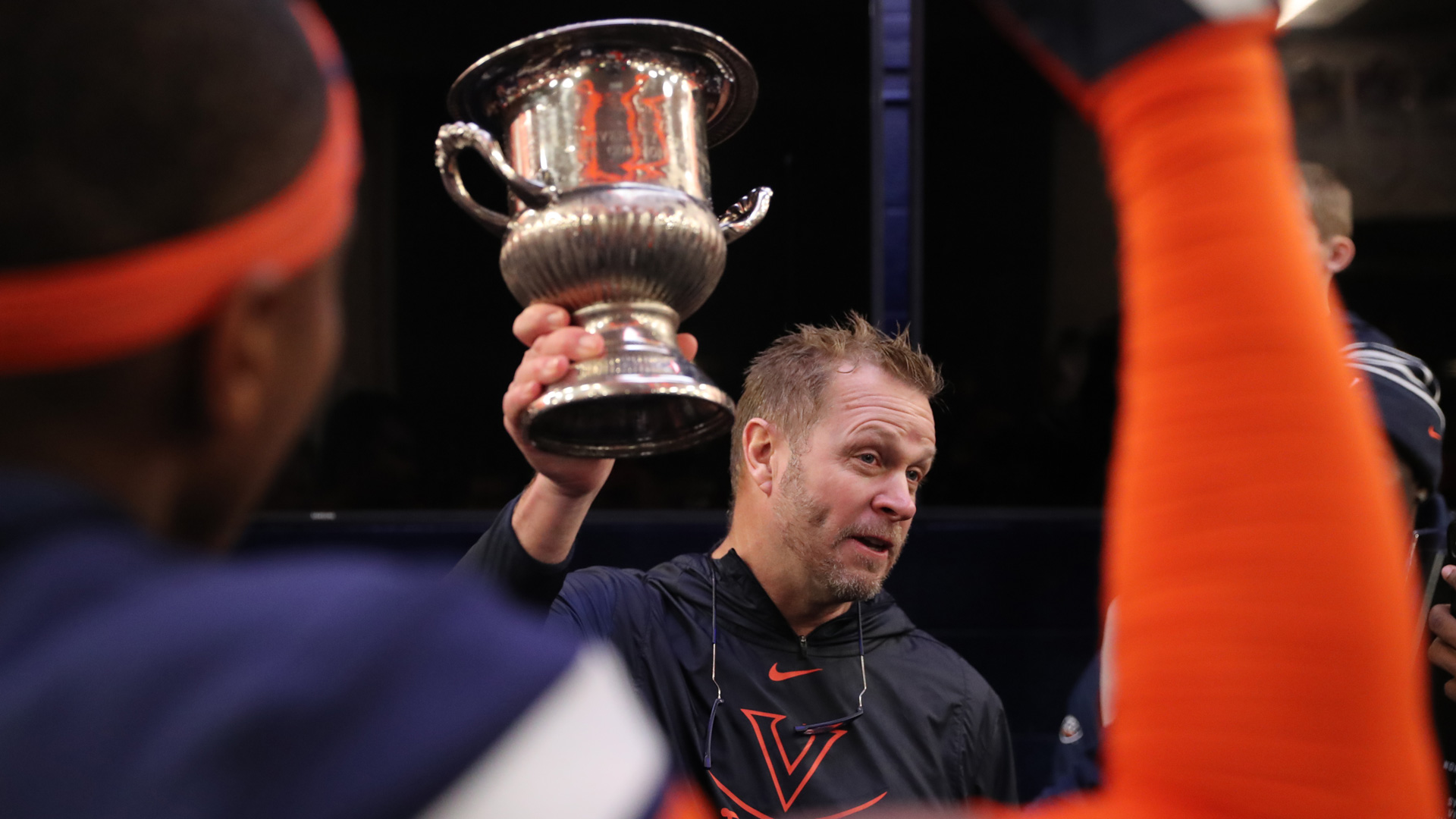
By Melissa Dudek
With the Virginia football team’s 39-30 victory over Virginia Tech, Black Friday was anything but “black” for Hoos fans as the postgame “Break The Rock” chant echoed in the home locker room, floated out into Scott Stadium and on into the hearts and living rooms of Cavalier football fans across the globe.
The Commonwealth Cup was back in Charlottesville, and its owners were heading to Charlotte to play in the ACC championship game as the Coastal Division champions.
To say that spirits were high during the fall of the 2019-20 season would be an understatement.
Football’s nine-win season — capped by the squad’s first appearance in a New Year’s Six bowl game, a pairing against No. 9 Florida in the Orange Bowl at Hard Rock Stadium in Miami, since the College Football Playoff started in 2014 — powered much of the excitement sweeping across Grounds, but it was just one part of a great start to the year.
For the first time in school history, the Cavalier men’s and women’s soccer teams were simultaneously ranked No. 1 in the country in the United Soccer Coaches’ national polls.
On the women’s side, the Cavs spent seven weeks as the top-ranked team in the country, rattling off a 19-game unbeaten streak, the third longest in program history.
Even before the team moved up to the No. 1 ranking, there was excited chatter coming from Klöckner Stadium about first-year forward Diana Ordonez. The freshman phenom introduced herself to the collegiate soccer world by scoring at least one goal in each of her first five games and went on to tally 15 on the season, leading the conference in goals per game and tying for the nation’s lead among first-years.
The more seasoned players on the team also gave people something to talk about. Third-year goalkeeper Laurel Ivory allowed just six goals in 19 games, giving her the best goals-against average (0.31) in program history, a mark that also paced the ACC and was ranked third in the nation.
Ivory had a span of more than 775 consecutive minutes over five weeks in which she did not allow a goal. Unfortunately, she suffered an injury during the ACC Tournament finale that sidelined her for the NCAA Tournament.
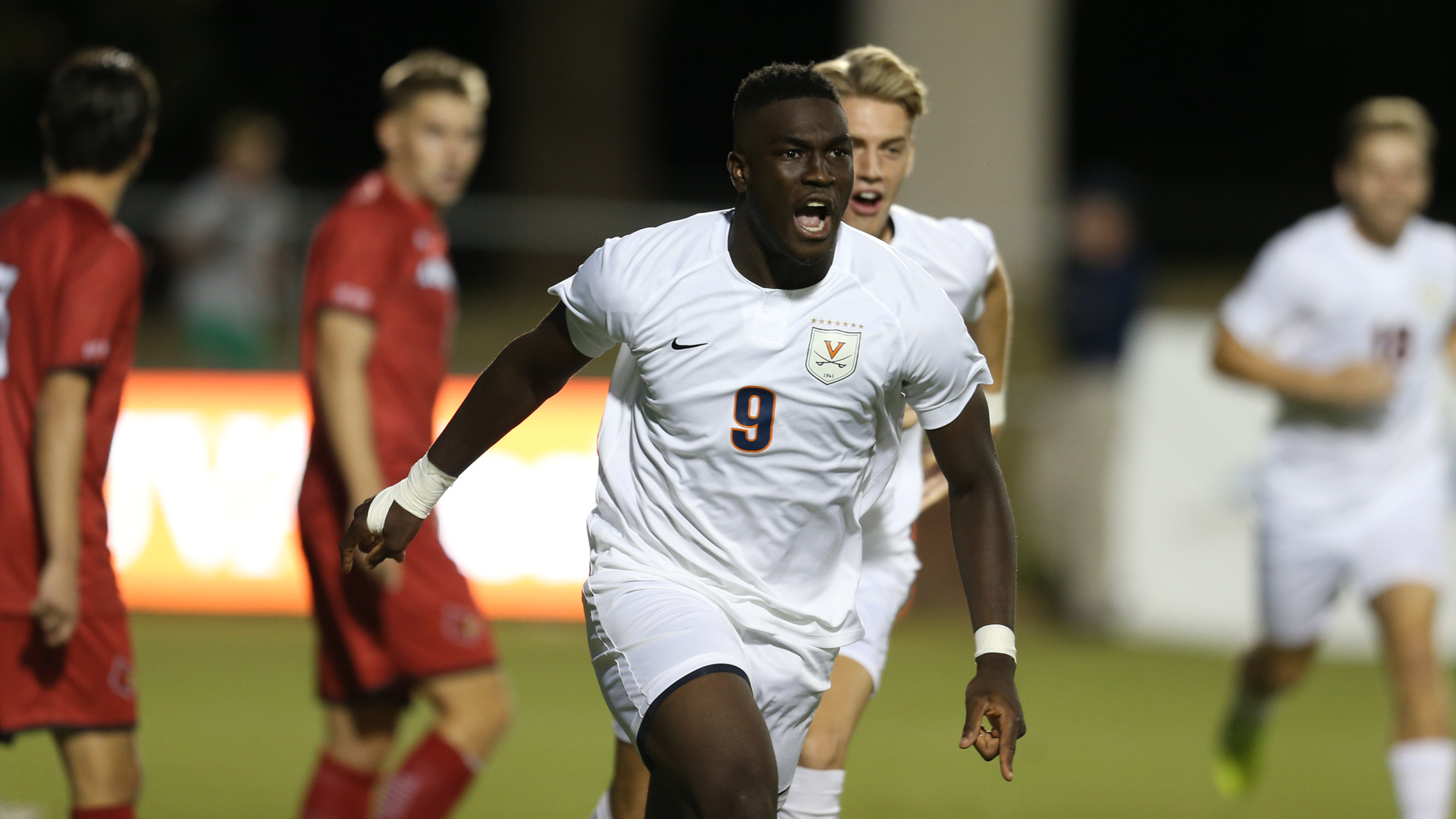
Second-year forward Daryl Dike and the UVA men’s soccer team captured the program’s first ACC championship since 2009 and advanced all the way to the final of the College Cup before finishing as the national runner-up. (Photo by Jim Daves/Courtesy UVA)
On the men’s side, the team rode its No. 1 ranking all the way into the NCAA Tournament, earning the top overall seed in the event for first time under longtime head coach George Gelnovatch. Along the way, the squad also picked up its first ACC championship since 2009 (the program’s 16th overall), hoisting the trophy in Cary, N.C., after a dramatic come-from-behind 3-1 victory over Clemson, in which they scored three second-half goals, including two in the final nine minutes.
The squad finished its ACC title run despite missing the conference’s Midfielder of the Year, third-year Joe Bell, who was in Europe playing for the New Zealand National Team. Bell returned to Charlottesville in time for the NCAA Tournament, where he helped the Wahoos advance all the way to the final of the College Cup, where they fell to Georgetown 3-3 on penalty kicks.
The NCAA final, just like the ACC championship match, required some late-game heroics with the College Cup’s Most Outstanding Player, second-year forward Daryl Dike, erasing a 3-2 deficit with 4:51 remaining in regulation to force overtime. However, third-ranked Georgetown outlasted UVA in a seven-round penalty kick shootout, leaving the Cavaliers to pick up the runner-up trophy on the same field in Cary that they had won their ACC title a few weeks earlier.
Bell was the first player in program history to be named the TopDrawerSoccer.com National Player of the Year. He was also men’s soccer’s first United Soccer Coaches Scholar Player of the Year and its first ACC Scholar-Athlete of the Year.
The UVA field hockey team also enjoyed a banner season, advancing to the Final Four for the first time in a decade, and doing so in dramatic fashion.
The No. 3-seeded Cavaliers hosted former ACC foe Maryland with a berth in the national semifinals on the line, a game that was scoreless at the end of regulation. Five-and-a-half minutes into the overtime period, second-year midfielder Annie McDonough deflected in a shot from third-year midfielder Rachel Robinson to give the Cavs the victory.
Robinson had a breakout season, earning first-team All-America honors as well as being named the ACC Scholar-Athlete of the Year. In addition, she was named to the roster of the US Senior Women’s National Team.
The Cavaliers’ new director of track & field and cross country, Vin Lananna, hit the ground running in the fall. UVA men’s cross country won its third NCAA Southeast Regional title, earning an automatic berth to the NCAA Championships. The Cavaliers were the only men’s program from the region to have five athletes named to the All-Region team, and Lananna was named the Southeast Region Men’s Coach of the Year just two months into his tenure.
As the winter sports kicked off, the momentum just kept building. In the first home meet of the season, first-year swimmer Kate Douglass set a pool record at the Aquatic and Fitness Center in the 200-yard breaststroke, besting the previous mark by more than four seconds. She went on to be named the ACC Freshman of the Year, winning five conference titles (two individual and three relays) while scoring 91 points for the Cavaliers at the ACC Championships.
Third-year Paige Madden was named the ACC Swimmer of the Year, the first Cavalier to do so since Olympian Lauren Perdue in 2011. Madden won individual titles in the 200-, 500- and 1,650-yard freestyle, and helped the 400- and 800-yard freestyle relay teams to victory.
Madden concluded the season with the second-fastest 500-yard freestyle time in the NCAA, in addition to ranking sixth in the mile, seventh in the 200-yard backstroke and seventh in the 200-yard freestyle.
Women’s swimming and diving head coach Todd DeSorbo was named the ACC Coach of the Year after leading the Cavaliers to the league title, the team’s 16th overall conference championship and DeSorbo’s second since taking over the program in 2017.
Virginia set a conference record for most points scored at the ACC Championships, tallying 1,492.5 over the four-day meet. UVA won 10 conference titles, which included capturing six individual races and four relay events. The team also tallied 36 All-ACC honors at the meet. The Cavaliers finished the season ranked No. 2 in the College Swimming and Diving Coaches Association’s final regular-season poll.
The men’s team posted a runner-up finish at the ACC Championships, the program’s best showing since winning the league title in 2013. Fourth-year Ted Schubert won the 200- and 400-yard individual medley titles, setting the school record in the former at the championships.
Swimmers weren’t the only Cavaliers hoisting ACC hardware. Redshirt fourth-year wrestler Jay Aiello claimed the conference title at 197 pounds, while fourth-year Jack Mueller was the runner-up at 125. Both earned top-10 seeds for the NCAA Championships that were canceled due to the COVID-19 outbreak.
On the indoor track, fourth-year Jordan Scott continued the dominance he had displayed the previous outdoor season, being named the ACC Indoor Field Athlete of the Meet at the ACC Championships after winning the triple jump — the fifth conference title of his illustrious career. He was also tabbed as the ACC Field Athlete of the Year, USTFCCCA Southeast Regional Field Athlete of the Year and an indoor All-American in the triple jump.
Derek Pekar became just the second first-year to win the ACC heptathlon title and the first since 2008. His 5,362 points were enough to set a UVA first-year record. Redshirt fourth-year pole vaulter Sam Young and fourth-year high jumper Brenton Foster also won their events.
Young topped the field with a height of 17 feet, 7.75 inches, setting a school mark in the process and became the first UVA competitor to win the indoor pole vault since 1958. Foster, who was the runner-up at last year’s championship, cleared 7 feet, 1.5 inches to claim the high jump title, the first Cavalier to win that competition since Herman Moore in 1990. Earlier in the season, Foster broke Moore’s long-standing record in the event with a clearance of 7 feet, 5 inches.
On the women’s side, Jada Seaman was named the ACC Freshman of the Year, becoming the first athlete in program history to earn that accolade. The first-year won the ACC title in the long jump and set two school records during her rookie season.
Though it wasn’t an ACC title, men’s squash won the Mid-Atlantic Squash Conference championship, earning a berth in the A-division of the College Squash Association Team Championships. Both the men’s and women’s teams earned their highest-ever finishes, with the men ranked fifth and the women ninth in the final polls.
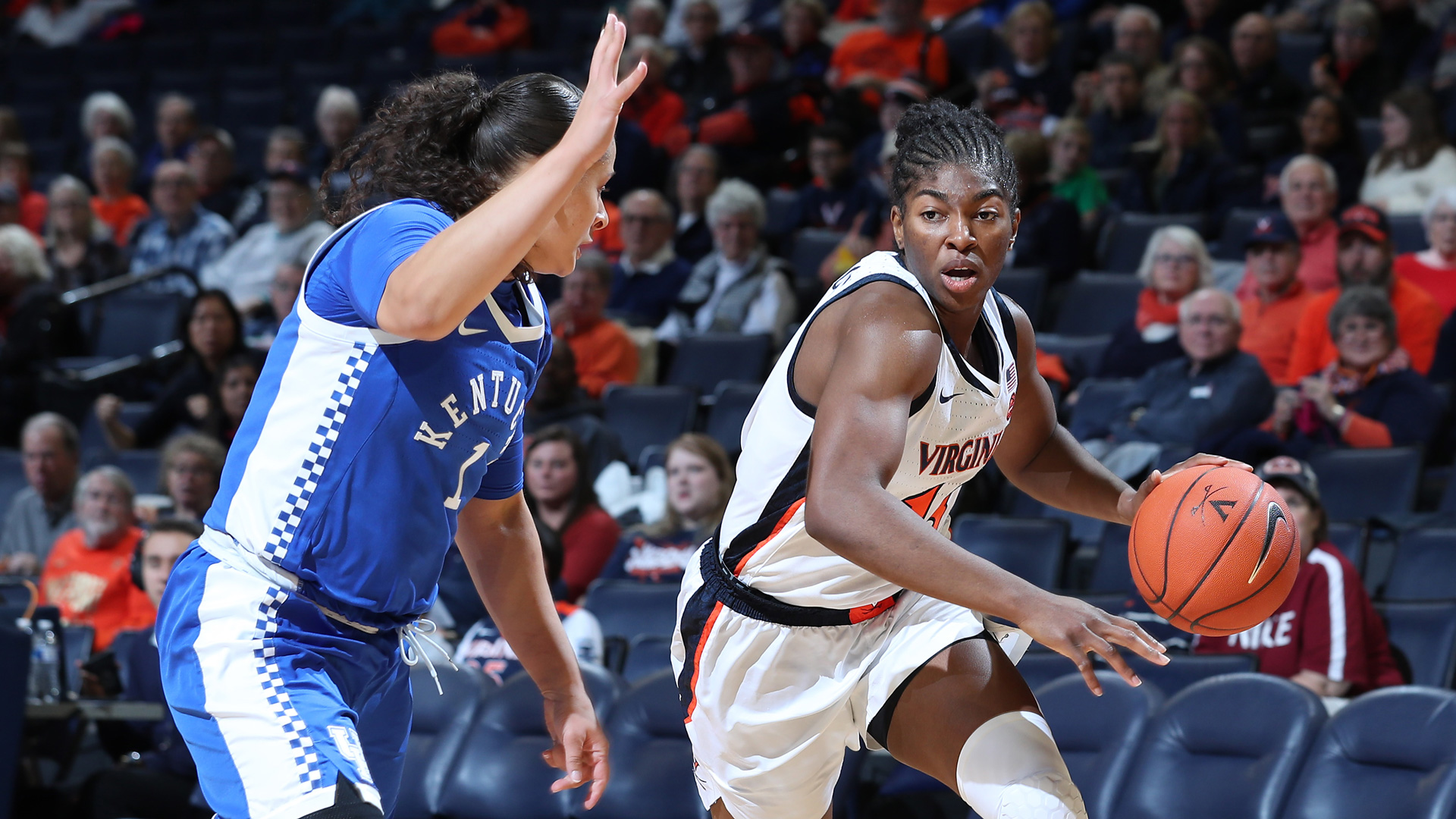
Jocelyn Willoughby tallied 19.2 points per game to become just the second player in UVA women’s basketball history to lead the ACC in scoring. (Photo by Matt Riley/Courtesy UVA)
On the hardwood, women’s basketball fans watched the great final act in the collegiate career of Jocelyn Willoughby. The fourth-year guard/forward, who had already etched her name into the record book as one of the program’s 1,000-point scorers during her third-year campaign, opened the season with a 31-point performance against Bucknell and finished as just the second player in program history to lead the ACC in scoring (19.2 points per game).
Willoughby also became the program’s first player since Monica Wright in 2010 to be selected in the WNBA Draft when she was taken in the first round with the No. 10 overall pick.
The defending national champion men’s basketball team finished the regular season with 23 wins and were heading to the postseason as the ACC’s hottest team. At one point in January, the Wahoos stood at 4-4 in conference play, but they closed the regular season with eight straight victories, including home wins over top-10 opponents Duke and Louisville. Redshirt fourth-year forward Mamadi Diakite anchored UVA’s top-ranked scoring defense that yielded just 52.4 points per game. He finished his career ranked second all time on UVA’s career blocked shots list with 156.
March Madness was about to begin with the sky the limit on what could still be achieved by UVA teams. The men’s basketball team was the No. 2 seed in the ACC Tournament. Six wrestlers were selected to the NCAA Championships. Twenty-two swimmers punched their tickets to their national meet. Five Hoos were about to travel to the NCAA Indoor Track Championships.
And then March’s unforeseeable madness began.
Just after noon on March 12, the ACC Men’s Basketball Tournament was canceled before the Cavaliers, who had a double bye in the tourney, had played a single game. Later that same day, NCAA President Mark Emmert and the Board of Governors canceled the Division I Men’s and Women’s NCAA Basketball Tournaments, as well as all remaining winter and spring sport championships.
The year of such promise came to an abrupt end.
Even though the spring sports had barely begun, several still managed to make their mark in the short time they were competing.
The first weekend of March, the UVA softball program celebrated the opening of Palmer Park. The stadium, named for Lisa Palmer, who starred at pitcher for the Cavaliers from 1986-89, and her mother, Fran, is a state-of-the-art facility that features an indoor player development center, locker room, team lounge, training room, press box and meeting spaces among other amenities. The ballpark features both chairback and grandstand seating behind home plate, grass hillside seating down the right field line and a berm for patrons beyond the outfield wall.
Two spring rookies garnered national honors. Women’s tennis player Natasha Subhash was named the Intercollegiate Tennis Association (ITA) National Rookie of the Year, and outfielder Chris Newell was tabbed the Collegiate Baseball Newspaper National Co-Freshman of the Year.
Women’s tennis first-year Natasha Subhash was named the ITA National Rookie of the Year after notching a 26-6 singles record and a season-high ranking of No. 10 nationally (Photo by Mike Riley/Courtesy UVA)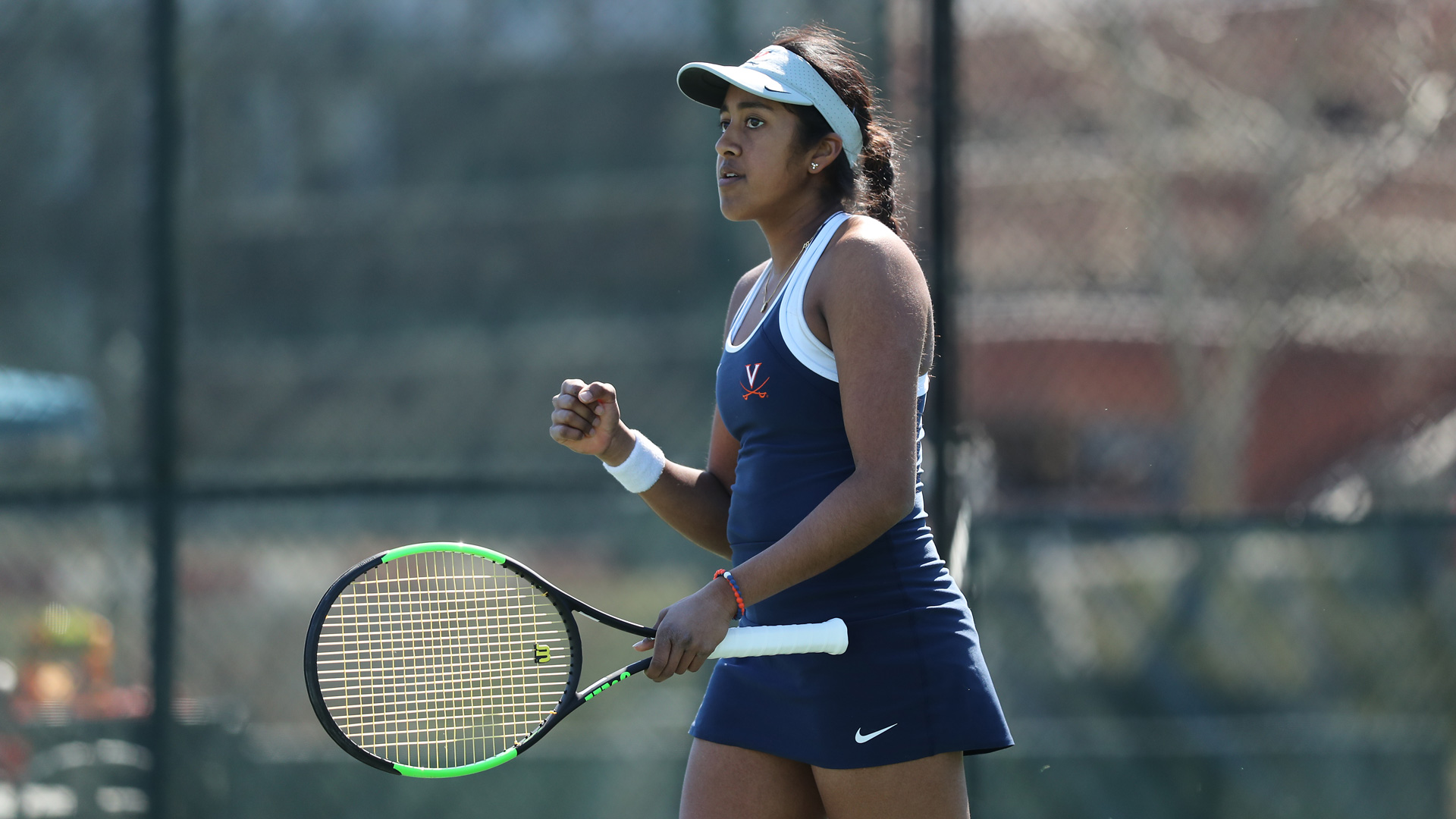
Subhash posted a 26-6 record in singles on the way to a season-high ranking of No. 10 nationally. She claimed the ITA Atlantic Region Championship in singles in the fall and advanced to the semifinals of the Oracle/ITA Masters tournament.
Center fielder Chris Newell became the first Virginia rookie ever to be recognized as the National Freshman of the Year after leading the team in both batting average (.407) and runs batted in (20). (Photo by Mike Riley/Courtesy UVA)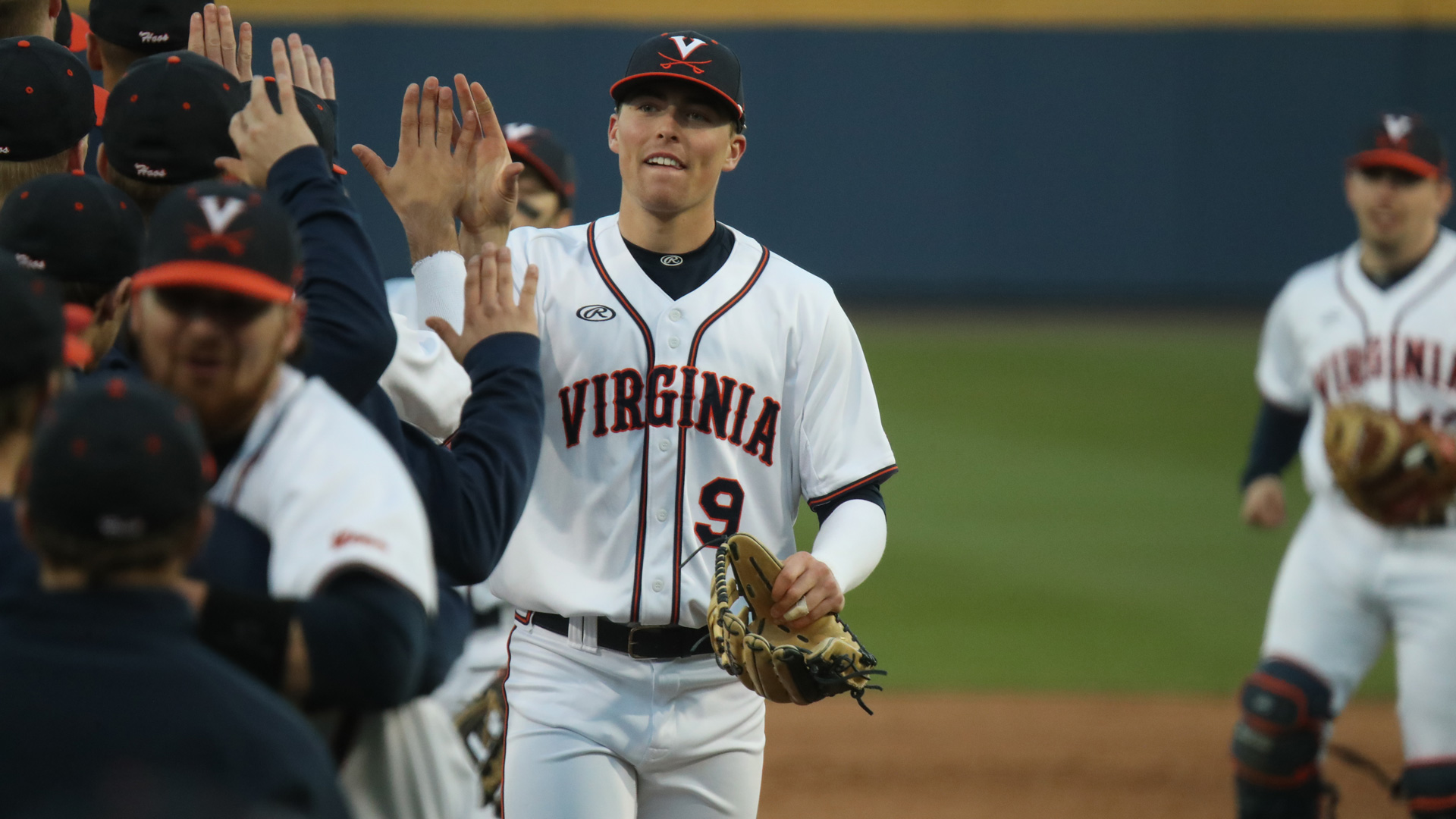
Newell, the first Virginia rookie ever to be recognized as the National Freshman of the Year, was also the first first-year to garner All-America honors since Danny Hultzen in 2009 after being named to Collegiate Baseball Newspaper’s second team. The Cavaliers’ everyday center fielder led the team with a .407 batting average (24 for 59) and 20 RBI.
Over his final 13 games, Newell batted .479 (23 for 48) with five doubles, a triple, four home runs and 20 RBI. He ranked among the top five in the ACC in six different categories — RBI (tied for second), on-base percentage (.545, second), slugging percentage (.729, third), runs (21, tied for third), total bases (43, tied for fourth) and stolen bases (eight, tied for fifth).
What will competitions and championships look like in 2020-21? That is something that is yet to be seen, but with the student-athletes back on Grounds and returning to workouts, there is an optimistic energy and a determination in every single one of them to go out and build on last year’s success.
Excelling In The Classroom
Even when school moved online in the spring, UVA student-athletes continued to work hard in their virtual classrooms.
Seventy-seven student-athletes were named to ACC All-Academic teams last year. The athletics department achieved its highest Graduation Success Rate (94 percent) and a record total of 497 UVA student-athletes were named to the ACC Honor Roll for registering a grade point average of 3.0 or better for the full academic year.
Joe Bell (men’s soccer), Jordan Mack (football), Rachel Robinson (field hockey), Paige Madden (swimming) and Jocelyn Willoughby (women’s basketball) earned ACC Scholar-Athlete of the Year honors.
Sammy Mueller (women’s lacrosse), Carl Söderlund (men’s tennis), Ted Schubert (men’s swimming), Meghan McCool (women’s soccer), Madden and Willoughby earned CoSIDA Academic All-America accolades.
Mack, Söderlund and Zoe Morse (women’s soccer) received Weaver-James-Corrigan postgraduate scholarships from the ACC, while Willoughby and Schubert received postgraduate scholarships from the NCAA.
— Melissa Dudek
